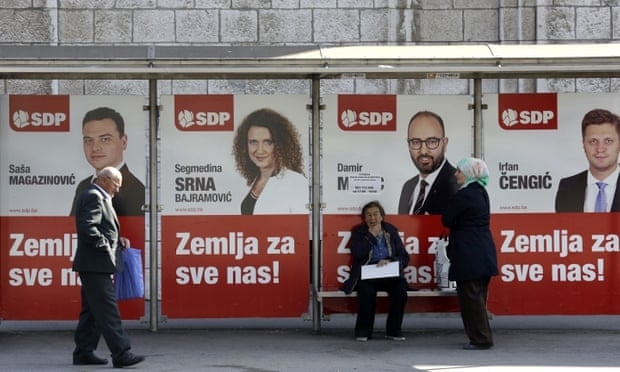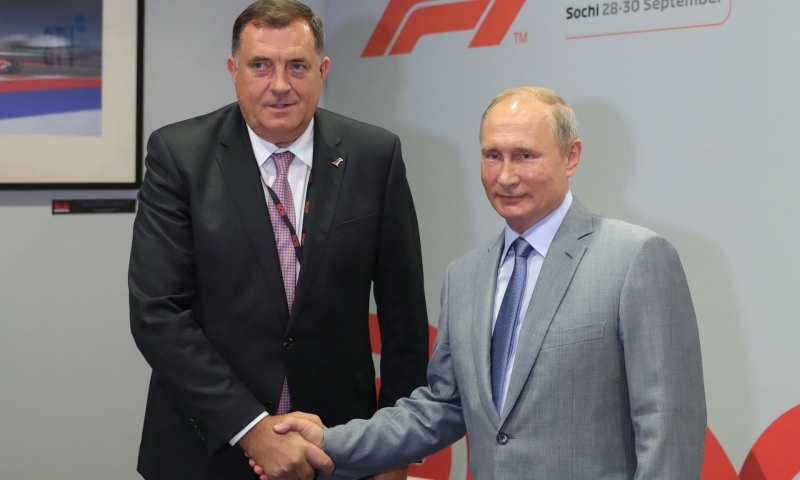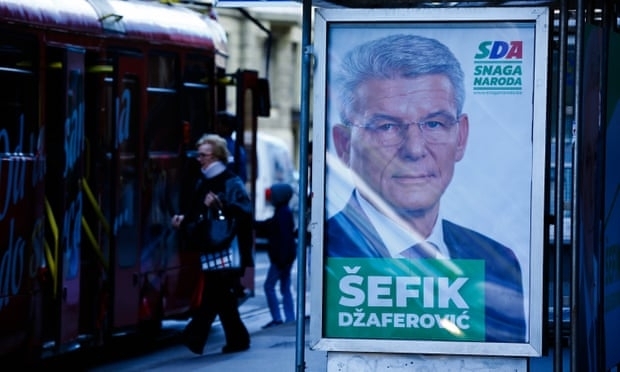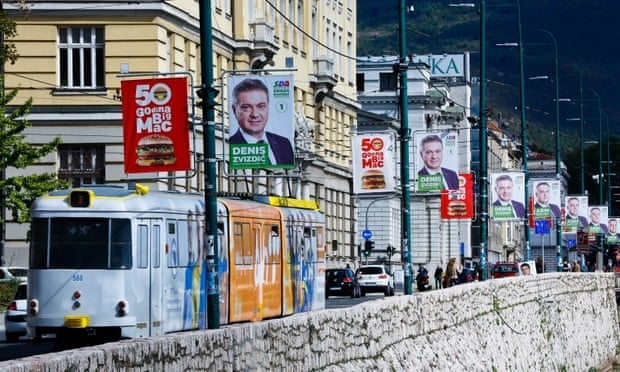On a tree-lined riverbank in the Sarajevo district of Grbavica, Rabina Baltić pauses at her stall selling tubs of sweetcorn, and gestures in disgust.
“Future?” she asks. “There’s no future here! I have a university degree, but look how I work … We’ve lost hope. Every election it’s all mixed, religion and politics.”
Twenty-eight years after the end of its internecine war that left 100,000 dead, Bosnia-Herzegovina votes on Sunday to elect a bewildering number of national and sub-national presidencies, parliaments, and assemblies. Ethnic-nationalist parties representing the three main communities – Bosniak (Muslim), Serb, and Croat – are expected to top the polls as they have at most previous elections since the current political system was set up by the Dayton peace agreement in 1995.
Hope that change will come to one of Europe’s poorest countries is dwindling. The average monthly wage is just over €400 (£355), while unemployment stands at more than 20%, rising to over 45% among young people. The grim economic situation is a major factor driving emigration from the country.
But political frustrations are just as significant. People strolling the streets of Grbavica, a middle-class suburb once on the wartime frontline, express helplessness and bemoan the failure of Bosnia’s leftwing and multi-ethnic parties. The leading parties are accused of stoking tensions, while stuffing state-owned companies and the public administration with their supporters.
Adil Osmanović, minister of civil affairs and a member the Bosniak nationalist Party of Democratic Action (SDA), which leads the government and tops the polls among Bosniaks, argues that the government has raised economic growth, created nearly 21,500 new jobs in the past year, and made progress in preparing the way for an application for EU membership.
But even some party loyalists are losing the faith. Husein Hrapović, 75, was one of the first members of the SDA when it was founded in 1990, joining it “because it was a kind of Muslim movement”.
“There have been scams and vote theft,” he says in the shop in Sarajevo’s bazaar district where he has worked for 55 years. “Now the party has its own people, who get jobs in state-owned companies. I don’t believe there’s a future; there are a lot of poor people and a lot of corruption. There could be another war in the next 10 years.”
Not everyone is so pessimistic. Denijal Šahinović, a young businessman who runs a small print shop in Sarajevo, says he works across the country with business partners and customers of all ethnicities with no animosity.

“I am optimistic that if we trade enough, we can fix this country,” he says. “But international people used to come to our classrooms and say that we were the future, and then people saw the easy route to jobs and money through the system.”
Bosnia-Herzegovina has fewer than 3.5 million voters. But thanks to the complicated web of ethnopolitical structures put in place by the Dayton peace agreement that brought the 1992-95 war to an end, next month’s elections will choose a national parliament, three members of the national presidency, the parliaments of the country’s two entities – the Serb-dominated Republika Srpska (RS) and the predominantly Bosniak and Croat Federation of Bosnia and Herzegovina – and 11 other assemblies.
A citizen can only be a member of the presidency if they declare themselves to be Bosniak, Serb, or Croat – barring those who declare as Jewish or Roma or merely Bosnian from becoming head of state.
“Dayton installed software that is outdated and has served its purpose,” says Osmanović, pointing out that thanks to the level of devolution, the country has 14 ministries of agriculture. Yet others see it as the price to pay for peace.
Attempts to change the status quo, with international support, have run aground. Plans to reform the political system were shelved and a new “reform agenda” focusing on economic liberalisation was launched by the EU and international financial institutions in 2015, with the UK and Germany the leading proponents. This has failed to meet expectations, and one international diplomat in Sarajevo refers to the EU’s attempts to grapple with Bosnia as “fucking useless”.
Meanwhile, concerns have grown about Russia’s influence in the Republika Srpska. Milorad Dodik, who has been effective leader of the RS for over a decade and is the leading candidate to be the Serb member of the national presidency, met Vladimir Putin in Russia on 30 September, reportedly securing the Russian president’s backing for his election.

But the RS government and Aleksandar Vučić, the president of neighbouring Serbia, have accused western powers of “meddling” in the Bosnian elections.
Similar claims are levelled at another neighbour, Croatia. Šefik Džaferović, the presidential candidate for the Bosniak nationalist SDA, has attackedKolinda Grabar-Kitarović, the president of neighbouring Croatia, for alleged interference in Bosnia’s internal affairs.
Many ethnic Croats in Bosnia feel the political system discriminates against them. While ethnic Serbs have their own entity, the Republika Srpska, Croats and Bosniaks must share the other, the Federation of Bosnia and Herzegovina, where tactical voting can allow the Croat member of the presidency to be chosen by Bosniak votes.
Dragan Čović, the nationalist Croat member of the presidency, has lobbied for a third, Croat, entity. He argues this would put his ethnic group on an equal footing with Bosniaks, but critics fear it would further add to Bosnia’s centrifugal forces.
These concerns have been amplified in recent months by a potential partition or “land-swap” deal between Serbia and Kosovo, which some fear could set a precedent for the Republika Srpska to leave Bosnia.

Dodik has repeatedly called for the RS to break away, although he has recently toned down his rhetoric. He is also under mounting pressure due to continuing demonstrations over the mysterious death of a 21-year-old.
“Dodik doesn’t know how to do politics without tensions,” says Branislav Borenović, the leader of the RS opposition Party of Democratic Progress. “He doesn’t talk about education, agriculture, everyday life. We don’t have time or energy to waste on new conflicts.”
In Istočno Sarajevo, part of the capital that lies in the RS, many support independence, but without great enthusiasm, with day-to-day concerns weighing more heavily.
“I think it’s definitely a good idea to divide, because things just aren’t the same after the war,” says Zeljana Vasković, a 24-year-old unemployed woman. “Even the youth are divided. People naively vote thinking they will change things, but politicians only know how to steal money.”
More about: Bosnia-Herzegovina
















































